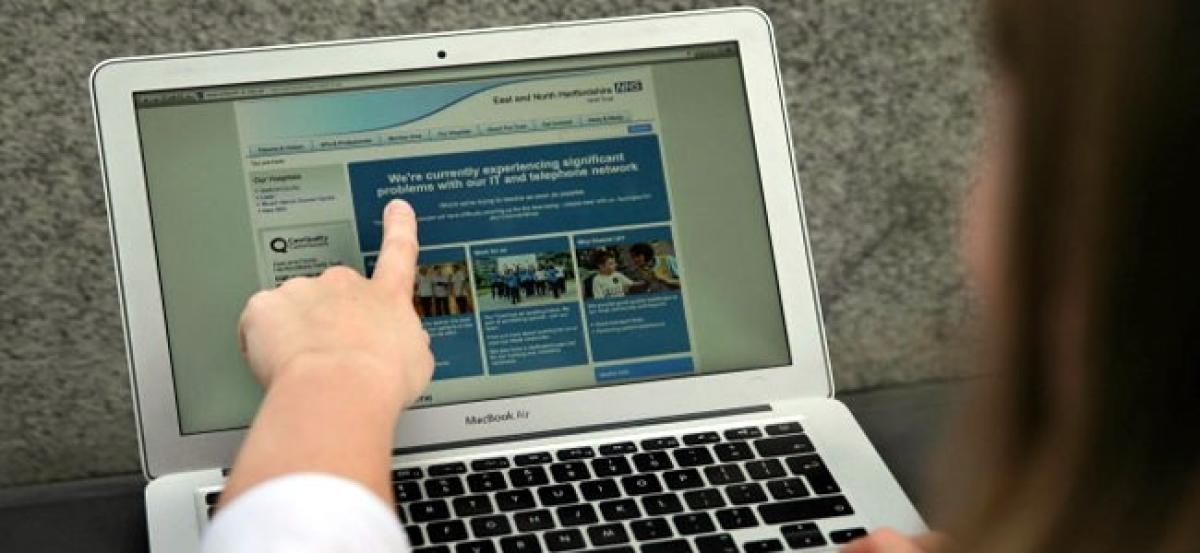Live
- To become the youngest world champion is truly a great feat: Gill congratulates Gukesh
- Case Filed Against Allu Arjun Under Four Sections
- Remembering A Visionary Leader.
- CREDAI Bengaluru seeks govt support for E-Khata issues
- Driverless Namma Metro nets revenue of `230 crore even before its launch
- Uber launches women-only bike rides in Bengaluru
- Allu Arjun Arrested in Shocking Sandhya Theater Incident! Here’s What Happened
- Allu Arjun Arrested in Sandhya Theatre Stampede Case
- Gemini Update: Search and Summarize Google Drive Folders Easily
- Air ambulance for health emergencies: Helipad to come up in Victoria Hospital
Just In

A huge cyberattack brought disruption to Britain\'s health system on Friday and infected many Spanish companies with malicious software, and security researchers said a dozen other countries may be affected.
A huge cyberattack brought disruption to Britain's health system on Friday and infected many Spanish companies with malicious software, and security researchers said a dozen other countries may be affected.
Hospitals and doctors' surgeries in parts of England were forced to turn away patients and cancel appointments. People in affected areas were being advised to seek medical care only in emergencies. "We are experiencing a major IT disruption and there are delays at all of our hospitals," said the Barts Health group, which manages major London hospitals. Routine appointments had been cancelled and ambulances were being diverted to neighbouring hospitals.
Telecommunications giant Telefonica was among the targets in Spain, though it said the attack was limited to some computers on an internal network and had not affected clients or services. Authorities in both countries said the attack was conducted using 'ransomware' - malicious software that infects machines, locks them up by encrypting data and demands a ransom to restore access. They identified the type of malware as 'Wanna Cry', also known as 'Wanna Decryptor'.
A Telefonica spokesman said a window appeared on screens of infected computers that demanded payment with the digital currency bitcoin in order to regain access to files. In Spain, the attacks did not disrupt the provision of services or networks operations of the victims, the government said in a statement. Still, the news prompted security teams at large financial services firms and businesses around the world to review their plans for defending against ransomware attacks, according to executives with private cyber security firms.
A spokeswoman for Portugal Telecom said: "We were the target of an attack, like what is happening in all of Europe, a large scale-attack, but none of our services were affected."
British based cyber researcher Chris Doman of AlienVault said the ransomware "looks to be targeting a wide range of countries", with preliminary evidence of infections from 14 countries so far, also including Russia, Indonesia and Ukraine.
PM BRIEFED
A spokesman for British Prime Minister Theresa May said she was being kept informed of the incident, which came less than four weeks before a parliamentary election in which national security and the management of the state-run National Health Service (NHS) are important campaign themes. Authorities in Britain have been braced for possible cyberattacks in the run-up to the vote, as happened during 2016's US election and on the eve of May's presidential vote in France.
But those attacks - blamed on Russia, which has repeatedly denied them - followed a entirely different modus operandi involving penetrating the accounts of individuals and political organisations and then releasing hacked material online. The full extent of Friday's disruption in Britain remained unclear. "This attack was not specifically targeted at the NHS and is affecting organisations from across a range of sectors," NHS Digital, the computer arm of the health service, said in a statement.
Britain's National Cyber Security Centre, part of the GCHQ spy agency, said it was aware of a cyber incident and was working with NHS Digital and the police to investigate. A reporter from the Health Service Journal said the attack had affected X-ray imaging systems, pathology test results, phone systems and patient administration systems.
Although cyber extortion cases have been rising for several years, they have to date affected small-to-mid sized organisations, disrupting services provided by hospitals, police departments, public transportation systems and utilities in the United States (US) and Europe. "Seeing a large telco like Telefonica get hit is going to get everybody worried. Now ransomware is affecting larger companies with more sophisticated security operations," Chris Wysopal, chief technology officer with cyber security firm Veracode, said.
The news is also likely to embolden cyber extortionists when selecting targets, Chris Camacho, chief strategy officer with cyber intelligence firm Flashpoint, said. "Now that the cyber criminals know they can hit the big guys, they will start to target big corporations. And some of them may not be well prepared for such attacks," Camacho said.
In Spain, some big firms took pre-emptive steps to thwart ransomware attacks following a warning from Spain's National Cryptology Centre of "a massive ransomware attack." Iberdrola and Gas Natural, along with Vodafone's unit in Spain, asked staff to turn off computers or cut off internet access in case they had been compromised, representatives from the firms said.
It was not immediately clear how many Spanish organisations had been compromised by the attacks, if any critical services had been interrupted or whether victims had paid cyber criminals to regain access to their networks.

© 2024 Hyderabad Media House Limited/The Hans India. All rights reserved. Powered by hocalwire.com







